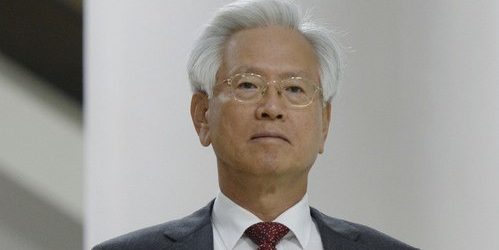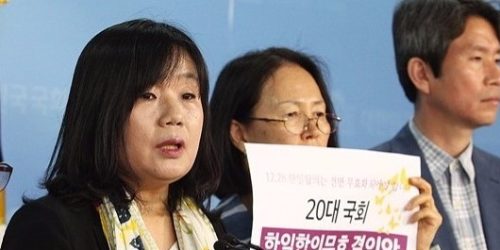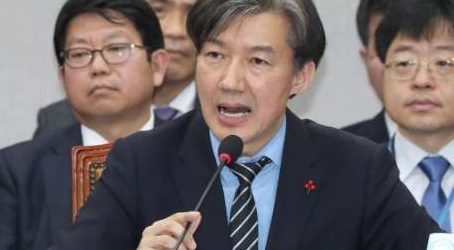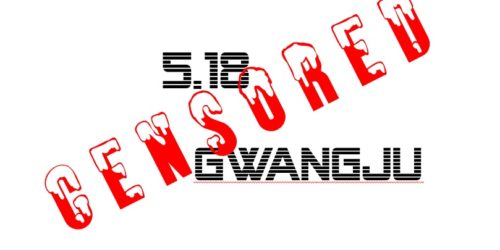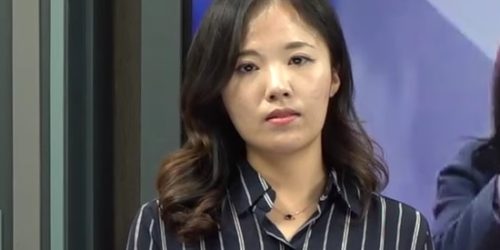Libel Lawsuits to Silence Free Speech Continue…South Korean Supreme Court Fines a Deceased Woman Jung ₩8 Million ($6,900) for Libel for referring to National Assemblyman Kim Sung-hwan as “Pro-North Korea”
2019-12-25, Tara O
The presiding judge of South Korea’s Supreme Court Ahn Cheol-sang (안철상) ruled on December 22, 2019 that Ms. Jung Mi-hong (정미홍), who passed away from lung cancer in July 2018, must compensate National Assemblyman Kim Sung-hwan (김성환), Deobureo Minjoo Party (Democratic Party of Korea), for libel by paying a fine of ₩8 million ($6,900).
In January 2013, Jung Mi-hong, former KBS announcer, tweeted “We must remember Seoul Mayor, Seongnam Mayor, Nowon District Chief, and other heads of municipal governments with pro-North Korea inclination and must weed them out in the next year’s local elections. Let’s remember.”
National Assemblyman Kim Sung-hwan was the Chief of Nowon District in Seoul at that time. Kim sued Jung for libel, saying his political life was threatened. Kim sought ₩100 million ($86,000) in damage.
At the initial trial, the court ruled that “expressing ‘pro-North Korea’ to public officials is defamatory” and that it goes beyond freedom of expression, and thus is illegal. The Appellate Court and the Supreme Court agreed with the lower courts’ decision.
Kim Sang-hyun (김상현), a self-made franchise restaurant CEO, has publicly criticized the Supreme Court’s ruling, posting on his Facebook “The Republic of Korea has become a ‘pro-North Korea’ society, where calling a ‘pro-North Korea’ (person) ‘pro-North Korea’ is punishable. This is precisely what suppressing freedom of expression is like. A communist country is like that.”
There has been a series of libel suits for calling someone “pro-North Korea” or “communist.” President Moon Jae-in sued Koh Young-ju for libel calling Moon a communist. Koh was found not guilty. (See here.)
Moon’s former Chief of Staff Im Jong-seok sued Dr. Ji Man-won for libel for calling Im a “communist” and “Jusapa” (Juche Ideology faction or Kim Il-sung followers). Im was the head of the radical Jeondaehyup (National Council of Student Representatives) in the 1980s, who sent a fellow student Lim Su-kyung to North Korea. Bradly Martin states:
Im Jong-seok served a prison term for behavior that a court considered aiding his country’s main enemy, North Korea. Im was convicted and sentenced in 1989 after arranging an illegal visit to Pyongyang by a fellow leftist activist, a visit that North Korea’s regime milked for propaganda advantage.
This libel case is still open.
In another case, Lee Jung-hee (이정희), former leader of the radical Unified Progressive Party (UPP) (outlawed), and her husband, lawyer Shim Jae-hwan (심재환) sued journalist Byun Hee-jae (변희재) for libel for calling them “pro-North Korea” and “Jusapa.”
[Note: The UPP was dissolved by the Constitutional Court in 2013. Its lawmaker, Lee Seok-ki (이석기), who became a non-elected, proportional representative, was found guilty of sedition. He had told an underground group to help North Korea by destroying roads, gas tanks, and other lines of communications in the rear area, should there be a war with North Korea. Lee was also one of the founders of Anti-Imperialism Youth Alliance (반제청년동맹), which adopted Kim Il-sung’s Juche Ideology as its guiding principle. (1) Another underground organization Minhyukdang–(Korean) People’s Democratic Revolutionary Party, 민혁당–was built upon the Anti-Imperialism Youth Alliance, and had close ties with North Korea since its inception. (2)]
The court initially took Lee Jung-hee’s side. On October 30, 2018, however, the Supreme Court, rescinded the lower court’s decision, and stated the expressions “pro-North Korea” and “Jusapa” do not apply to defamation or insult.
The Supreme Court explained that “excessive pressure to take responsibility should not be used as a method to prevent expressing political opinions or free discussions…If the scope is too widely recognized or the boundaries are blurred, the fundamental right of freedom of expression in the Constitution becomes empty and unstable.”
As seen above, South Korea’s Supreme Court has shown inconsistencies in the way it handles the libel lawsuits and freedom of expression issue, especially as the make up of the judges who compose the Supreme Court changes. The fact that so many public officials sue citizens for libel is also problematic, as it has the effect of using the laws to suppress freedom of speech and freedom of the press. The situation has reached a point in which a deceased woman is found liable for defamation, because she posted on social media “pro-North Korea” to describe some of the politicians.
Reference (other than hyperlinked ones):
- Han Gi-hong, The Dark Side of the Progressives: South Korea’s Underground Revolutionary Organizations and North Korea, 2012, Seoul: Shidae Jeongshin, 38.
- Ibid, 34.
